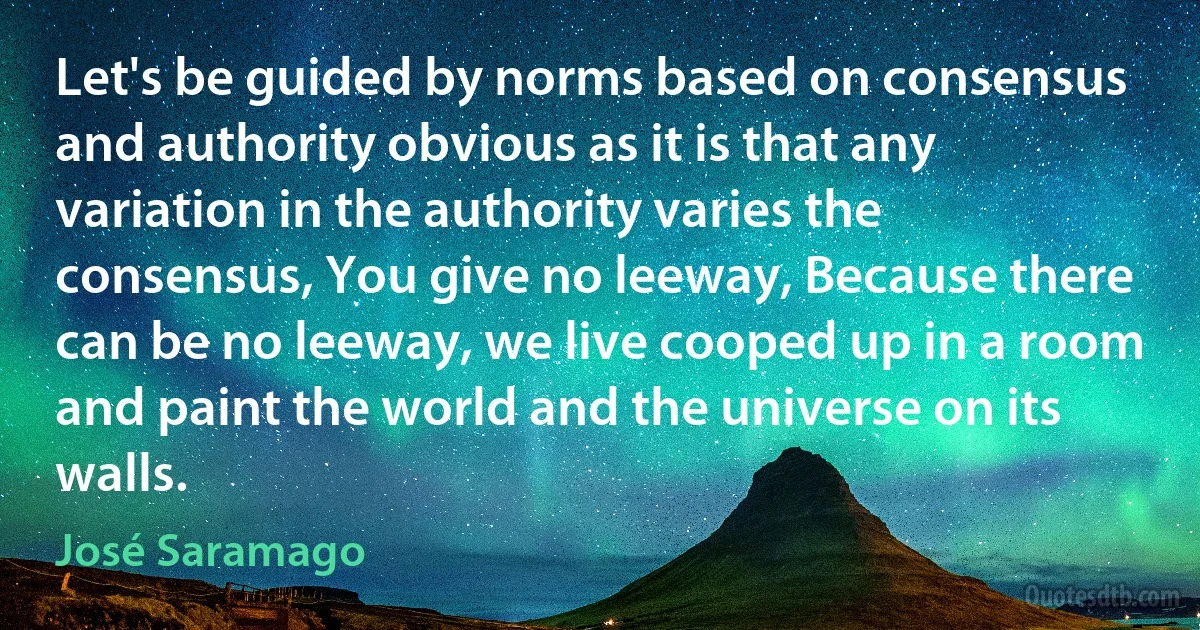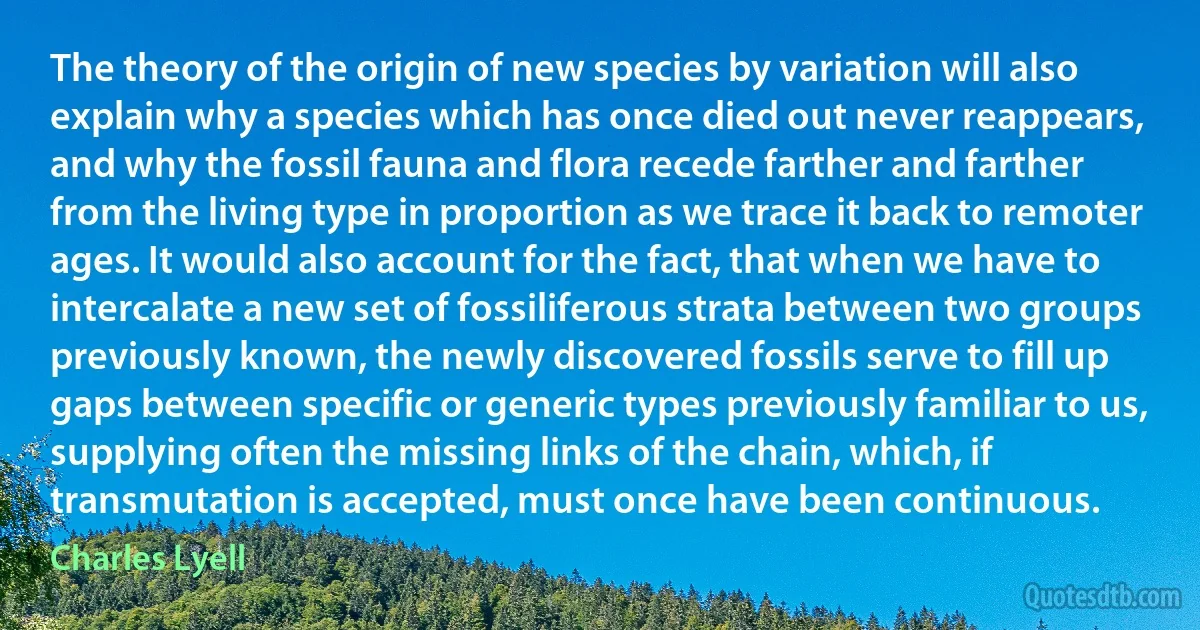Variation Quotes - page 3
If the whole of natural theology, as some people seem to maintain, resolves itself into one simple, though somewhat ambiguous, at least undefined proposition, that the cause or causes of order in the universe probably bear some remote analogy to human intelligence: If this proposition be not capable of extension, variation, or more particular explication: If it affords no inference that affects human life, or can be the source of any action or forbearance: And if the analogy, imperfect as it is, can be carried no farther than to the human intelligence, and cannot be transferred, with any appearance of probability, to the other qualities of the mind; if this really be the case, what can the most inquisitive, contemplative, and religious man do more than give a plain, philosophical assent to the proposition, as often as it occurs, and believe that the arguments on which it is established exceed the objections which lie against it?

David Hume
But this (a listing of illustrations of how the genome can change other than by mutations) doesn't constitute a crisis-it's a very interesting finding that shows that variation in a genome can arise by processes other than mutation of an organism's own DNA. The disposition of that variation still must occur via either natural selection (it can be good or bad) or genetic drift (no effect on fitness). This hasn't really changed the theory of evolution one iota, though it's changed our view of where organisms can acquire new genes.

Jerry Coyne
You can give music variation without changing the notes. When you get close to a piece there will inevitable be tinkering. I sometimes wonder if concert pianists expend so much effort and energy finding new ways to interpret that what they really need is some more direct form of self-expression.

Joanna MacGregor
An aria in an opera - Handel's 'Ombra mai fu,' for example - gets along with an incredibly small number of words and ideas and a large amount of variation and repetition. That's the beauty of it. It's not taxing to the listener's intelligence because if you haven't heard it the first time round, it'll come around again.

James Fenton
Based upon evidence such as already presented, it appears feasible to set up criteria by which to determine when assignable causes of variation in quality have been eliminated so that the product may then be considered to be controlled within limits. This state of control appears to be, in general, a kind of limit to which we may expect to go economically in finding and removing causes of variability without changing a major portion of the manufacturing process as, for example, would be involved in the substitution of new materials or designs.

Walter A. Shewhart
The only secondary cause... which has, as yet, been even conjecturally brought forward, to explain how, in the ordinary course of nature, a new specific form may be generated is, as Lamarck declared, 'variation,' and this has been rendered a far more probable hypothesis by the way in which Natural Selection is shown to give intensity and permanency to certain varieties.

Charles Lyell
If, however, one factor is too successful, it will continue to be the winning factor regardless of the variation in the other factors over the range of variation in the conditions, and therefore will stifle the development of other advantageous factors until the conditions change sufficiently that it no longer is the winning factor. At this point, the whole population is ill prepared for the change, and may well perish entirely if the winning factor accidentally becomes the matching factor for a disease or a predator.

Erik Naggum
For some variation it would be better
to place the donkey seen from behind
[to avoid] all faces looking out of the picture [forward]
And the tree could also have more foliage.
1. Joseph has been portrayed too fat and too recklessly
2. Mary should hold the child more gently
because a vulnerable child can't stand being held so firmly
Joseph is too short fat - his head is growing from his trunk
and both [Joseph & Mary] their heads are too big.

Rembrandt
The geometric line is an invisible thing. It is the track made by the moving point; that is, its product. It is created by movement – specifically through the destruction of the intense self-contained repose of the point. Here, the leap out of the static to the dynamic occurs. [...] The forces coming from without which transform the point into a line, can be very diverse. The variation in lines depends upon the number of these forces and upon their combinations.

Wassily Kandinsky
It was little consolation that I had been ‘in good company' in my ignorance of genetics; in fact, that aspect of the situation seemed even more alarming to me. I was overwhelmed by the realization of the almost Herculean job that would be needed to get the majority of psychologists and educators fully to recognize the importance of genetics for the understanding of variation in psychological traits. Hence, rather than attempting at first to add small increments of original empirical research to the body of knowledge on the genetics of human abilities, I thought my most useful role at that point was a primarily didactic one.

Arthur Jensen
Now the compound or composite may be supposed to be naturally capable of being dissolved in like manner as being compounded; but that which is uncompounded, and that only, must be, if anything is, indissoluble. ...And the uncompounded may be assumed to be the same and unchanging, where the compound is always changing and never the same? ...Is that idea or essence, which in the dialectical process we define as essence of true existence-whether essence of equality, beauty, or anything else: are these essences, I say, liable at times to some degree of change? or are they each of them always what they are, having the same simple, self-existent and unchanging forms, and not admitting of variation at all, or in any way, or at any time?

Socrates
We may not be the center of the universe and the telos of evolution, but we are concrete embodiments of cosmic processes in their particular terrestrial variation. And, albeit accidentally, we did happen to evolve a most remarkable property: self -reflection. In virtue of this we may be among the very few species of natural systems in the universe which are able not only to sense the world and respond to it, but to know their own sensations and come to reasoned conclusions about the nature of the universe. To be a man is thus to have the almost unique opportunity of getting to know oneself and the world in which one lives. It is surely shortsighted to disregard this opportunity and confine oneself solely to the business of living. A failure to exploit our capability for rational knowledge is, moreover, contrary to the business of living.

Ervin László
I want to focus on each scene. I'm a real perfectionist, and I don't want to feel like I didn't consider every possible variation of a scene. I come from a theater background, so I'm used to a lot of repetition, and I'm used to really attacking something over and over and over again.

Michael Shannon
Even in the simplest societies, no two people learn quite the same cultural material; the chance encounters of daily life provide sufficient variation to ensure that. No set of cultural understandings, then, provides a perfectly applicable solution to any problem people have to solve in the course of their day, and they therefore must remake those solutions, adapt their understandings to the new situation in the light of what is different about it.

Howard S. Becker
The way in which the universe expands is determined by the variation of this [radius of curvature] R with the time. There are three types, or families, of non-static universes... the oscillating universes, and the expanding universes of the first and of the second kind. ...each of these is a representative of a family, comprising an infinite number of members differing in size and shape. ...In the expanding family of the first kind the radius is continually increasing from... zero... In the expanding series of the second type the radius has at the initial time a certain minimum value, different for the different members of the family. [Both kinds of expanding families] become infinite after an infinite time.

Willem de Sitter



